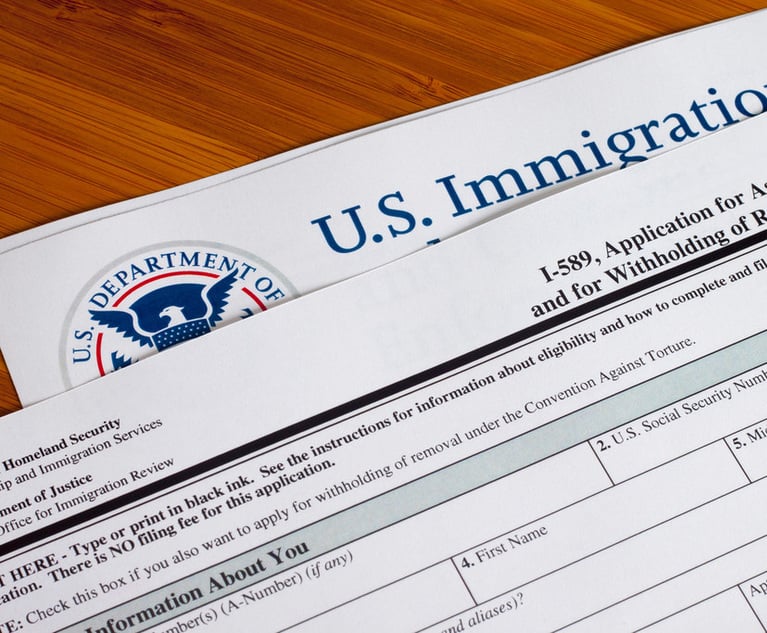'Cannabis on Our Doorstep': Connecticut Lawyers Brace for Potential Change
Connecticut legal experts discussed the ramifications on attorneys of the possibility that the state Legislature and Gov. Ned Lamont would sign off on approving recreational marijuana use.
February 07, 2020 at 01:00 PM
4 minute read
 Young person smoking marijuana. Photo: Shutterstock.com
Young person smoking marijuana. Photo: Shutterstock.com
As the public awaits a possible vote on legalizing marijuana in the Nutmeg State this year, attorneys are looking on with special interest.
Observers say legalizing cannabis would affect criminal defense attorneys, corporate and regulatory lawyers, industry and labor attorneys, and litigators across several practice areas.
In fact, Hartford solo practitioner DeVaughn Ward said every attorney in the state should pay close attention to what the Connecticut Legislature does in the first half of 2020.
"All attorneys will be affected in some way," said Ward, senior legislative counsel of the Marijuana Policy Project, which advocates for governments to tax and regulate marijuana in a manner similar to alcohol. "Even if you do civil litigation, I imagine at some point you will end up litigating a person or business with a tie-in to cannabis. If passed, this will be an emerging industry in Connecticut and will touch every facet of the law."
Ward said attorneys have adopted a wait-and-see approach. The Connecticut General Assembly was set to vote on legalizing recreational marijuana use last year, but ran out of time during the session, and the proposal never made it to the floor for a vote.
"I think that a lot of practitioners are really waiting to see what the Legislature passes to be able to better advise their clients," Ward said.
Pullman & Comley member Steven Stafstrom Jr., who chairs the House Judiciary Committee, told the Connecticut Law Tribune Friday the odds of passage in the 2020 legislative session are "better than they were last year."
A strong proponent of recreational legalization, Stafstrom said the change would have far-reaching tentacles.
"This would affect a wide range of attorneys," he said.
Beyond the changes in criminal law, employment lawyers would need to pay attention to their clients' policies and corporate document language to advise employers on how to properly regulate cannabis within their businesses. Corporate and regulatory lawyers would need to be able to educate clients on licenses to grow or sell, while tax attorneys and banking lawyers would pay attention to financial and tax implications.
Stafstrom said he's heard from "more lawyers in favor of legalization, than those opposed."
"They know cannabis is on our doorsteps in the form of legalization in neighboring states," he said.
Recreational marijuana is legal in Massachusetts and, in New York, legislators are looking at several bills.
In Connecticut, government estimates indicate recreational marijuana could generate upward of $30 million in tax revenue in the first year, according to the state General Assembly's nonpartisan Office of Fiscal Analysis.
Bloomfield solo practitioner Aaron Romano, a supporter of recreational cannabis use, said he believes lawyers should be at the table from the onset.
"Attorneys should be involved in the legislative process, and not just wait until it happens," Romano said. "Those attorneys should contact their local legislators and volunteer their time, and tell their legislators they'd like to be a part of the process."
But there are critics who oppose the legalization of recreational marijuana.
Among them Vincent Candelora, a Republican representative in the state Legislature.
"Just look at Colorado, which has had recreational marijuana for several years," Candelora told the Connecticut Law Tribune in a recent interview. "The statistics there show a big negative impact. Car fatalities have increased and homelessness has increased."
The legislative session began Wednesday and ends May 6.
Related stories:
NY and Conn. Governors Team Up to Tackle Cannabis, Vaping
Connecticut Lawyers React to Failed Marijuana Legalization Efforts
This content has been archived. It is available through our partners, LexisNexis® and Bloomberg Law.
To view this content, please continue to their sites.
Not a Lexis Subscriber?
Subscribe Now
Not a Bloomberg Law Subscriber?
Subscribe Now
NOT FOR REPRINT
© 2025 ALM Global, LLC, All Rights Reserved. Request academic re-use from www.copyright.com. All other uses, submit a request to [email protected]. For more information visit Asset & Logo Licensing.
You Might Like
View All
'Battle of the Experts': Bridgeport Jury Awards Defense Verdict to Stamford Hospital
3 minute read
Settlement Allows Spouses of U.S. Citizens to Reopen Removal Proceedings
4 minute read
Judge Awards Over $350K in Attorney Fees in Data Breach Class Action Settlement
3 minute read
Silk Road Founder Ross Ulbricht Has New York Sentence Pardoned by Trump
3 minute readTrending Stories
- 1US Judge Dismisses Lawsuit Brought Under NYC Gender Violence Law, Ruling Claims Barred Under State Measure
- 24th Circuit Upholds Virginia Law Restricting Online Court Records Access
- 3Lawsuit Against Major Food Brands Could Be Sign of Emerging Litigation Over Processed Foods
- 4Fellows LaBriola LLP is Pleased to Announce that Alisha Goel Has Become Associated with The Firm
- 5Law Firms Turn to 'Golden Handcuffs' to Rein In Partner Movement
Who Got The Work
J. Brugh Lower of Gibbons has entered an appearance for industrial equipment supplier Devco Corporation in a pending trademark infringement lawsuit. The suit, accusing the defendant of selling knock-off Graco products, was filed Dec. 18 in New Jersey District Court by Rivkin Radler on behalf of Graco Inc. and Graco Minnesota. The case, assigned to U.S. District Judge Zahid N. Quraishi, is 3:24-cv-11294, Graco Inc. et al v. Devco Corporation.
Who Got The Work
Rebecca Maller-Stein and Kent A. Yalowitz of Arnold & Porter Kaye Scholer have entered their appearances for Hanaco Venture Capital and its executives, Lior Prosor and David Frankel, in a pending securities lawsuit. The action, filed on Dec. 24 in New York Southern District Court by Zell, Aron & Co. on behalf of Goldeneye Advisors, accuses the defendants of negligently and fraudulently managing the plaintiff's $1 million investment. The case, assigned to U.S. District Judge Vernon S. Broderick, is 1:24-cv-09918, Goldeneye Advisors, LLC v. Hanaco Venture Capital, Ltd. et al.
Who Got The Work
Attorneys from A&O Shearman has stepped in as defense counsel for Toronto-Dominion Bank and other defendants in a pending securities class action. The suit, filed Dec. 11 in New York Southern District Court by Bleichmar Fonti & Auld, accuses the defendants of concealing the bank's 'pervasive' deficiencies in regards to its compliance with the Bank Secrecy Act and the quality of its anti-money laundering controls. The case, assigned to U.S. District Judge Arun Subramanian, is 1:24-cv-09445, Gonzalez v. The Toronto-Dominion Bank et al.
Who Got The Work
Crown Castle International, a Pennsylvania company providing shared communications infrastructure, has turned to Luke D. Wolf of Gordon Rees Scully Mansukhani to fend off a pending breach-of-contract lawsuit. The court action, filed Nov. 25 in Michigan Eastern District Court by Hooper Hathaway PC on behalf of The Town Residences LLC, accuses Crown Castle of failing to transfer approximately $30,000 in utility payments from T-Mobile in breach of a roof-top lease and assignment agreement. The case, assigned to U.S. District Judge Susan K. Declercq, is 2:24-cv-13131, The Town Residences LLC v. T-Mobile US, Inc. et al.
Who Got The Work
Wilfred P. Coronato and Daniel M. Schwartz of McCarter & English have stepped in as defense counsel to Electrolux Home Products Inc. in a pending product liability lawsuit. The court action, filed Nov. 26 in New York Eastern District Court by Poulos Lopiccolo PC and Nagel Rice LLP on behalf of David Stern, alleges that the defendant's refrigerators’ drawers and shelving repeatedly break and fall apart within months after purchase. The case, assigned to U.S. District Judge Joan M. Azrack, is 2:24-cv-08204, Stern v. Electrolux Home Products, Inc.
Featured Firms
Law Offices of Gary Martin Hays & Associates, P.C.
(470) 294-1674
Law Offices of Mark E. Salomone
(857) 444-6468
Smith & Hassler
(713) 739-1250










